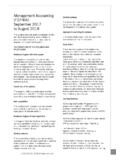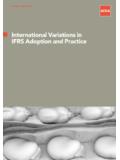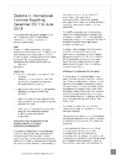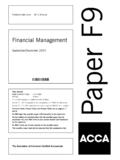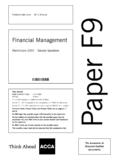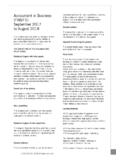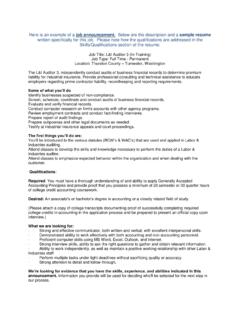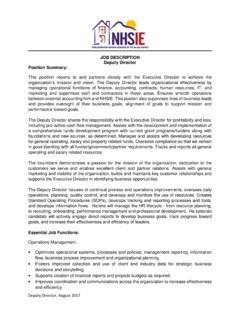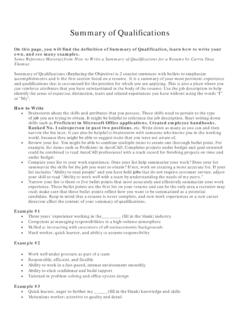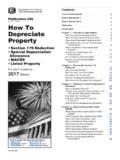Transcription of IPSAS implementation: current status and challenges
1 IPSAS . implementation: current status and challenges About ACCA. ACCA (the Association of Chartered Certified Accountants) is the global body for professional accountants, offering business-relevant, first-choice qualifications to people of application, ability and ambition around the world who seek a rewarding career in accountancy, finance and management. ACCA supports its 198,000 members and 486,000 students in 180 countries, helping them to develop successful careers in accounting and business, with the skills required by employers. ACCA works through a network of 101 offices and centres and more than 7,291 Approved Employers worldwide, who provide high standards of employee learning and development.
2 Through its public interest remit, ACCA promotes appropriate regulation of accounting and conducts relevant research to ensure accountancy continues to grow in reputation and influence. Founded in 1904, ACCA has consistently held unique core values: opportunity, diversity, innovation, integrity and accountability. It believes that accountants bring value to economies in all stages of development and seek to develop capacity in the profession and encourage the adoption of global standards. ACCA's core values are aligned to the needs of employers in all sectors and it ensures that through its range of qualifications, it prepares accountants for business. ACCA seeks to open up the profession to people of all backgrounds and remove artificial barriers, innovating its qualifications and delivery to meet the diverse needs of trainee professionals and their employers.
3 More information is here: About this report This report examines the progress being made, as well as the current challenges faced, with the implementation of International Public Sector accounting Standards. The Association of Chartered Certified Accountants October 2017. Contents Introduction 4. Executive Summary 5. 1. Countries and stage of adoption of IPSAS : Asia 8. 2. challenges and success factors: Asia 9. 3. Countries and stage of adoption of IPSAS : Africa 14. 4. challenges and success factors: Africa 15. 5. Countries and stage of adoption of IPSAS : South America 17. 6. challenges and success factors: South America 18. 7. Countries and stage of adoption of IPSAS : Caribbean and Latin America 20.
4 8. challenges and success factors: Caribbean and Latin America 21. 9. Countries and stage of adoption of IPSAS : Europe 23. 10. challenges and success factors: Europe 24. Conclusions 26. References 27. Introduction International Public Sector accounting financial crisis, which reduced the of IPSAS adoption across a range of Standards ( IPSAS ) are the public sector resources that governments had developing countries, identifying equivalent of International Financial available. In some instances, information commonalities and emerging issues. Reporting Standards (IFRS). IFRS have contained in cash based financial Specifically the study considers the been credited with providing a more statements had been insufficient for adoption of IPSAS focusing on: transparent and accurate financial countries to predict and prevent overview of listed companies around the sovereign liquidity crises.
5 To attract Date of announcement and date world, using accruals accounting as foreign direct investment, countries have of adoption opposed to cash accounting . The move initiated financial management reform towards using IPSAS in the public sector programmes, including the adoption of Overview of progress to date has the potential to radically change the accrual accounting as part of broader practice of accounting and financial reform programmes. Success factors reporting in the sector, just as IFRS have accomplished with listed companies. These factors have encouraged countries challenges experienced across the world to make statements The adoption of IPSAS is gaining concerning the adoption of standards The study is based on desktop reviews of momentum across the world.
6 In 2015, the established on either cash basis IPSAS or existing public information, including: European Union announced the accrual basis IPSAS , with various annual reports of ministries of finance or establishment and adoption of European deadlines. Countries have used differing supreme audit institutions; public Public Sector accounting Standards approaches in their adoption of IPSAS expenditure framework assessment (EPSAS) based on IPSAS with adoption and are in different stages of adoption, reports; IFAC, World Bank and IMF. dates to be determined by the respective with some having just started, while reports; and presentations at public sector countries. Further afield, Australia and others have completed the process.
7 The conferences. We also reviewed published New Zealand have already converted level of success has varied and is typically academic research papers studying the from IFRS to IPSAS type standards for the measured by the outcomes of the effects of implementing IPSAS . public sector. In Africa, South-East Asia external audit process. and South America, statements of support Senior public sector leaders were for IPSAS have also encouraged a trend This report examines progress across a consulted to validate the findings, analyse of adoption across developing countries. sample of developing countries where the reasons for IPSAS adoption and the much of the recent IPSAS commentary benefits and costs involved, as well as the The need for greater transparency and has been focused.
8 The list is not intended challenges and their solutions. We thank accountability in government financial to be exhaustive, rather it aims to give all those who participated in the study. reporting was heightened by the global select insights into the current status quo 4. Executive summary This study considers the current state of processes across the sector. Increased which internal reporting practices can the adoption of IPSAS across the world. standardisation supports the delivery flourish, and acting as a catalyst for Our examination of different countries of more effective audits and helps stronger financial capability and value suggests IPSAS adoption has started to mitigate the risks of significant material add'.
9 The pillars of sound financial provide significant and common misstatements. The use of IPSAS is management practices such as advantages across the public sector, yet instrumental in forging closer budgetary control, cost accounting , important challenges remain in the integration between financial and financial performance management, roadmap to full adoption. critical non-financial information, strategic investment planning and providing a more holistic understanding forecasting are better supported. BENEFITS OF IPSAS ADOPTION of the true performance of public sector entities. IPSAS can streamline 6. Professionalisation and access to 1. Greater accountability and standard reporting processes and talent.
10 The adoption of IPSAS plays transparency. There is compelling support the consolidation of all the a significant part in increasing evidence that IPSAS provide greater activities and accounts of various professionalisation' of the finance clarity on the financial position of government entities and sub-entities; function and accounting across the public sector entities across the world. so providing a meaningful audit report. public sector. It presents significant IPSAS are important in promoting Consolidated accounts are the basis opportunities to increase the influence transparency and thereby curbing for more informed, and subsequently of the finance organisation, while fraud and corruption.
